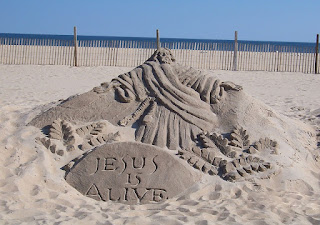You have the authority to be a forgiving person. If you're not, who will be? If you decide not to be a forgiving person, you hurt the people who need it the most, and you hurt yourself.
But these have been written in order that you may believe that Jesus is the Messiah, the Son of God, and that through your faith in him you may have life. (John 20:31 GNT)
But these have been written in order that you may believe that Jesus is the Messiah, the Son of God, and that through your faith in him you may have life. (John 20:31 GNT)
Transcript of the [audio for this sermon] preached extemporaneously
at Briensburg UMC on April 28, 2019.
This passage of scripture begins to take place on the
evening of the resurrection when Jesus appeared to ten of His disciples behind
closed doors, then it continues the next Sunday when eleven were there, when Thomas
was there.
And Thomas always gets kind of the brunt on this. I guess
they picked on him about this through the years, because he didn't believe
everybody's story. But really a lot of other people have that problem too,
including the other people that were poking fun at him about not believing.
Sometimes it's hard to wrap our minds around things and to
believe things. There were a lot of things Jesus did, too much to be able to
write down. But these were written so that you could have some things that you
could get a hold of that you could believe, and that by believing, you could
have life in His name.
One of the important things Jesus did these first days of
his witness was to breathe the Holy Spirit on His disciples and give them the
authority to forgive sin. He had already been breathing life into them. He had
already been breathing the Word of God to them, and He had already been giving
this authority in His teachings.
His authority was challenged by many of the religious
leaders when He would say to people, "Your sins are forgiven," and
they would say, "Well who are you to forgive sins?" A lot of times He
would heal people as a sign, not only of His love for them and His caring about
their condition, but as a sign that their sins were forgiven.
That's an important part of our whole faith, the heart of
the gospel message. The forgiveness of sins. That we don't hold things against
each other, that we have tolerance for one another. If you think of a machine,
sometimes call that forgiving, whether it be a vehicle or some kind of
equipment or something, you say, "This is forgiving."
You don't mean that you confess your sins to it and it
forgave you of those sins. You mean in a broader sense, it doesn't hold
anything against you and it gives you a lot more flexibility and a lot more
leeway in what you're doing before you would get hurt by it or hurt something
else by it.
And that's the kind of people God invites us to be, people
who are forgiving, who are not so rigid that everything we touch and everybody
we come against gets hurt by us. But instead, we're like God, we're like Christ
in the sense that we don't hold the things against people, but instead we open
our lives to each other, embrace each other and love one another as Christ has
loved us.
And so when He breathes into us the Holy Spirit, He
breathes it with that proclamation. Those whose sins you forgive are forgiven.
Those whose sins you do not forgive are not forgiven. You can go either way
with this. You have the authority to forgive sins. You have the authority to be
a forgiving person. If you're not, you will be.
And if you decide not to use that authority and to not
forgive and not be a forgiving person, who do you hurt? You hurt the people who
need it the most and you hurt yourself because Jesus still said at the end of
the Lord's Prayer, "If you do not forgive the sins of other people, then
neither will your Heavenly Father forgive you your sins."
And he still has those parables that demonstrate if you
hold other people's sins against them, even those sins that you feel are
forgiven can be brought back up against you of your own sins.
The way that you decide how you're gonna hold something
against other people is the way God will decide how things will be held against
you. That's treading on thin ice when you are not a forgiving person.
The power of the Holy Spirit is the power to love as
Christ has loved. In the book of Mark in the 16th chapter when he sent everybody
out, he sent them out with all these signs, similar to what Christ had done in
His commissions to us and the various ways they're presented in the Bible.
He tells us we're empowered to continue the same work that
he did, to love, to heal, to forgive, to bring joy and comfort and
encouragement to the people around us. In this process, we come alive ourselves
and we extend that life to the people around us.
These things that have been written here in the Bible are
just a few of the things Jesus did. There's not room to record everything that
God has done for us. There's not room for all the things that God has done for
me or for you or for our families. But these are written in order that we might
believe.
In our prayer times, we're always having the time of
unspoken concerns and I ask how many have unspoken concerns. Everybody in this
room has things that we don't talk about and name with each other for prayers,
but we know that we have those things on our hearts, don't we?
We have things that we're going through or our families or
our friends or people that we care about are going through. We need to believe.
We need to be able to believe the promises of God, the things that are written.
That He wants us to have life. We need to be able to encourage each other to
believe those promises and to trust Christ with our lives and souls.
And we know that our family and friends that are not here
in this room are included in that same number, those that we'll see when we leave
this room and go to other tables and other rooms throughout the week.
And so we need to greet each person that we meet along the
way with the same love and forgiveness that Christ greets us with and extend
the same love to them that we receive from Christ, and the faith and confidence
and the hope that we have in Christ, we need to share that as fully and freely
as we share it here in this room with one another.
The world needs Christ. That's what this Bible is all
about, pointing us to Christ. Helping us to point each other to the one who
loves us, the one that we can trust and follow, one who cares about us, one who
empowers us and breathes into us the Holy Spirit.
In the name of Jesus,
Amen.Transcript of the [audio for this sermon] preached extemporaneously
at Briensburg UMC on April 28, 2019.



